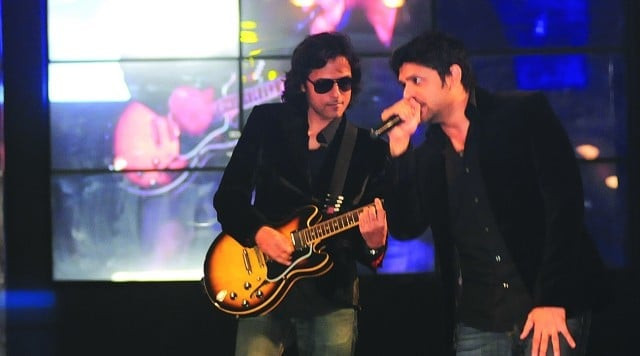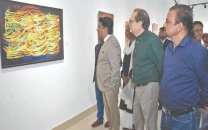Musical fluff

The video, which is entirely made up of solemn shots of the three musicians (Faisal Kapadia, Bilal Maqsood and Atif Aslam) performing amid snatches of actual news footage (the attack on the Marriott Hotel in Islamabad and the Ashura procession in Karachi feature), is surprisingly unlike Jami’s work. The director, who has made far better videos for Strings such as “Dhaani”, relies on the same template from Strings’ “Koi Aanay Wala Hai” video.
But directorial decisions aside, the song lyrics are not a realistic perspective, nor do they inspire one to take any concrete action. The video shows a lawyer beating up a policeman, policemen beating up suspects, without raising the question of what exactly is one supposed to do after watching this brutality?
Don’t bother looking for a clue in the lyrics, which the three musicians wrote themselves: “Ab khud kuch parne paray ga / hum ko / jalna paray ga / marna paray ga.”
The song can be interpreted in several ways, depending on one’s frame of mind. With lyrics like “Kab tak rona paray ga / jo hai khona paray ga / kehta hai sunlo mere yaar,” the song is either imploring people to join the armed forces or engage in vigilante justice. The video ends with the clichéd, done to death shots; of a girl holding a diya, a Pakistani flag fluttering in the wind, and the three musicians looking out on the Karachi skyline.
The problem with videos and songs such as this one is that they appear to be borne out of a need musicians in Pakistan feel they have to react to the socio-political situation in the country. But they provide ambiguous messages, which could easily be construed to be part of a love song instead of rousing people to ‘do something’.
As a comparison, the Strings video for “Beirut”, a song made about the 2003 war in Lebanon, was far more hard-hitting, using info graphics to describe the effects of war on civilians. There was a clear message that provided awareness to viewers who may not know how the war machine works.
Manan Ahmed, who is a historian of Pakistan and blogs at chapatimystery.com, says, “I think the video is vague both in its presentation of what the ‘problem is’: we have footage of bribery, police brutality, crimes, and then terrorism all woven together without differentiation, and then we have the prescription: ‘kuch karna’ do something to it. They could have at least said, ‘let’s oppose it’.”
In a 2009 report and video about Pakistani music for the New York Times, journalist Adam Ellick stated, “[....] a surge of bubble-gum stars who have become increasingly politicised. Some are churning out ambiguous, cheery lyrics urging their young fans to act against the nation’s woes. Others simply vilify the United States.” It is unfortunate that Strings and Atif Aslam have fallen into the first trap.
Published in The Express Tribune, July 19th, 2010.



















COMMENTS
Comments are moderated and generally will be posted if they are on-topic and not abusive.
For more information, please see our Comments FAQ